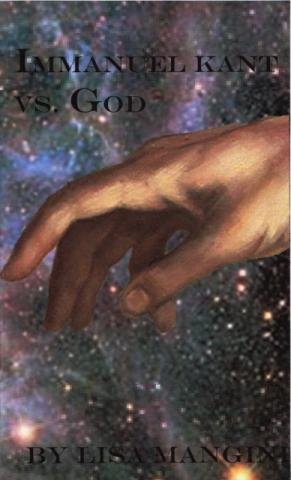Immanuel Kant vs. God by Lisa Mangini
Poetry
48 pages
7" x 4.25" two signatures, dos-i-dos form, with hand sewn bindings
Published December 2014
Lisa Mangini’s Immanuel Kant vs. God pairs the heavens and the earth, the self and the divine in the same way Dana Hoeschen’s exquisite design honors the dualities, separations and unions with which so many philosophies grapple. This chapbook is a collection of erasure poems from Kant’s Universal Natural History and Theory of the Heavens. In part, it takes on persona poems from the perspective of Kant, allowing the reader to see how easily Kant’s theories translate into the problems of the contemporary world. In part, it takes on persona poems from the perspective of the supreme being, grappling with how mysterious it is to be teacher and creator.
Poetry
48 pages
7" x 4.25" two signatures, dos-i-dos form, with hand sewn bindings
Published December 2014
Lisa Mangini’s Immanuel Kant vs. God pairs the heavens and the earth, the self and the divine in the same way Dana Hoeschen’s exquisite design honors the dualities, separations and unions with which so many philosophies grapple. This chapbook is a collection of erasure poems from Kant’s Universal Natural History and Theory of the Heavens. In part, it takes on persona poems from the perspective of Kant, allowing the reader to see how easily Kant’s theories translate into the problems of the contemporary world. In part, it takes on persona poems from the perspective of the supreme being, grappling with how mysterious it is to be teacher and creator.
Poetry
48 pages
7" x 4.25" two signatures, dos-i-dos form, with hand sewn bindings
Published December 2014
Lisa Mangini’s Immanuel Kant vs. God pairs the heavens and the earth, the self and the divine in the same way Dana Hoeschen’s exquisite design honors the dualities, separations and unions with which so many philosophies grapple. This chapbook is a collection of erasure poems from Kant’s Universal Natural History and Theory of the Heavens. In part, it takes on persona poems from the perspective of Kant, allowing the reader to see how easily Kant’s theories translate into the problems of the contemporary world. In part, it takes on persona poems from the perspective of the supreme being, grappling with how mysterious it is to be teacher and creator.
